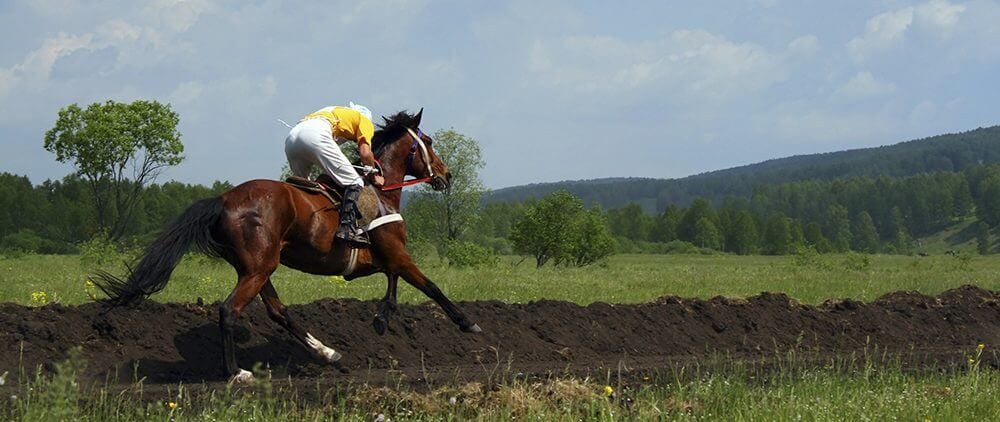A Natural Aid for Horses with Gastric Ulcers
I’ve always been a believer in keeping our equine partners’ lives as natural as possible. Because of this, my horses are on full time pasture in a herd setting. While this mindset developed out of the situation my first horse loved (and my absolute certainty that he had to have friends with him at all times), I learned later that it has probably saved me trouble over the years. Pasture living provides mental stimulation, exercise, a natural feeding regimen and can prevent a host of health issues, including gastric ulcers.
I have friends who seem to be in a constant battle with this condition. Symptoms can range from changes in appetite (often refusing to eat grain), “girthiness” and irritability, to anorexia and colic.
According to Dr. Katie Delph, assistant professor of equine internal medicine at Kansas State University, sport horses across all disciplines can have a combined gastric ulcer prevalence of 60 percent and higher. With those odds, it’s important to be aware of both the prevention methods and treatment options.
How Can I Protect My Horse from Gastric Ulcers?
Ulcers are essentially sores in the horse’s stomach lining. They are more common in the squamous mucosa (upper) lining and caused by erosion from stomach acids. Ulcers on the glandular mucosa (lower) are less frequent and little is known about what causes them. Since horses are natural grazers, their digestive systems are meant to constantly have something to break down. When a horse instead receives a few feedings a day, extra acid can build up and cause ulceration. Stress and intensive training methods can also contribute.
Whether it’s because of their accident prone nature or job requirements, some horses just can’t be kept outside constantly. In the article “Keeping Horses Healthy: Update on Equine Gastric Ulcers” by Beth Davis, DVM, PhD, DACVIM, following these tips from the American Association of Equine Practitioners (AAEP) can help reduce the likelihood that your horse will develop ulcers:
- Allow free-choice access to grass or hay. Horses are designed to be grazers with a constant intake of roughage.
- If the horse must be stalled, arrange for the horse to see the horses he socializes with. Consider offering a ball or other object that the horse can enjoy in his stall.
- Feed your horse more frequently to aid with buffering stomach acid.
- Decrease grains that form volatile fatty acids (VFA). Feeds such as high carbohydrate sweet feed are more likely to contribute to VFA production.
- Medications that decrease acid production are available, but are only necessary in horses showing signs of clinical disease or when the predisposing factors, such as stress, cannot be removed. The most common preventative drug is known as UlcerGard, which is administered during times of stress to horses not currently suffering from ulcers.
How Can My Horse’s Ulcers Be Treated?
Once a horse is diagnosed with ulcers, Delph says that the go-to treatment is typically GastroGard. It contains the same active ingredient as UlcerGard, omeprazole (which suppress secretion of the hydrochloric acid that is causing the ulcers), but is administered over a 28 day period in higher doses.
Alterations to living environment can also be helpful, if possible. By allowing horses access to roughage throughout the day and removing whatever stress factors are possible, owners can help the healing process.
Another Alternative: Omega-3
Over the years, Wellpride fish oil pilot studies have shown a reduction in ulcer occurrence in thoroughbred racehorses, the group that Delph says “are kind of the prototype. They can have a prevalence of 80 to sometimes 100 percent.” The exact reasons why fish oil may be helpful have not been looked at in depth yet, but the correlation suggests that fresh fish oil with omega-3 fatty acids can act both as a preventative and treatment measure for gastric ulcers.
Using Omega-3s for Prevention
Balancing omega-3 and omega-6 can reduce inflammation in both organs and joints. Reducing inflammation in the stomach can lower the overall risk of ulcers. It can also help balance the bacteria that assist with digestion.
“Omega-3 has an antibacterial effect in humans, which means that it can participate in regulating the balance of the bacteria that you have in the gut flora,” Dr. Bo Martinsen, co-founder of Wellpride and Omega3 Innovations,“said. “That might be very important aspect in terms of preventing ulcers. I imagine it’s the same for horses.
Fish oil can also counteract the” negative effects of NSAIDs, one of the leading causes of ulcers.
“Omega-3 can increase blood flow and help with healing, or just preventing erosions from happening,” Delph said.
Using Omega-3s As Part of Treatment
In addition to the healing effect of increased blood flow, omega-3 fish oil can also act as a coating for the stomach lining. “Some fatty acids, as they are absorbed by a stomach lining, can help with healing,” Delph said. “They have a direct effect and don’t even need to be absorbed to make an impact.”
While the FDA has given us effective options for prevention and treatment of gastric ulcers through UlcerGard and GastroGard, it’s important to be aware of natural alternatives. By feeding fresh fish oil in addition to a well-maintained exercise and feeding schedule, we can give our horses one more defense against this painful condition.
References:
Davis, Beth.“Keeping Horses Healthy: Update on Equine Gastric Ulcers.”





